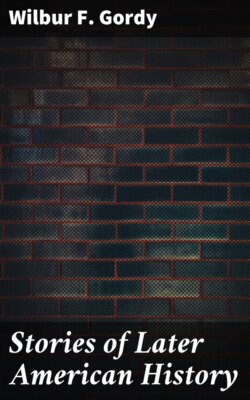Читать книгу Stories of Later American History - Wilbur F. Gordy - Страница 11
На сайте Литреса книга снята с продажи.
ОглавлениеSt. John’s Church, Richmond.
Patrick Henry is not one of these. He believes that the time has come when talking should give place to prompt, decisive action. The war is at hand. It cannot be avoided. The colonists must fight or slavishly submit.
So intense is his belief that he offers in this meeting a resolution that Virginia should at once prepare to defend herself. Many of the leading men stoutly oppose this resolution as rash and unwise.
At length Patrick Henry rises to his feet, his face pale, and his voice trembling with deep emotion. Again we see the bent shoulders straighten and the eyes flash. His voice rings out like a trumpet. As he goes on with increasing power, men lean forward in breathless interest. Listen to his ringing words:
“We must fight! I repeat it, sir, we must fight! An appeal to arms and to the God of Hosts is all that is left us! They tell us, sir, that we are weak; unable to cope with so formidable an adversary. But when shall we be stronger? Will it be the next week, or the next year? Will it be when we are totally disarmed, and when a British guard shall be stationed in every house? Shall we gather strength by irresolution and inaction? Shall we acquire the means of effectual resistance by lying supinely on our backs and hugging the delusive phantom of hope, until our enemies shall have bound us hand and foot? Sir, we are not weak if we make a proper use of the means which the God of nature hath placed in our hands. … There is no retreat but in submission and slavery! Our chains are forged! Their clanking may be heard on the plains of Boston! The war is inevitable—and let it come! I repeat it, sir, let it come!
“… Gentlemen may cry peace, peace—but there is no peace. The war is actually begun! The next gale that sweeps from the north will bring to our ears the clash of resounding arms! Our brethren are already in the field! Why stand we here idle? What is it that gentlemen wish? What would they have? Is life so dear, or peace so sweet, as to be purchased at the price of chains and slavery? Forbid it, Almighty God! I know not what course others may take; but as for me, give me liberty, or give me death!”
What wonder that the audience sways to his belief!
He was a true prophet, for in less than four weeks the first gun of the Revolution was fired in the quiet town of Lexington, Massachusetts. Undoubtedly Patrick Henry’s fiery spirit had done much to kindle the flame which then burst forth.
Not long after this, he was made commander-in-chief of the Virginia forces (1775), and the next year was elected governor of Virginia.
When the war—in the declaring of which he had taken so active a part—was over, Patrick Henry retired at the age of fifty-eight (1794), to an estate in Charlotte County called “Red Hill,” where he lived a simple and beautiful life. He died in 1799.
Without doubt he was one of the most eloquent orators our country has ever produced, and we should be grateful to him because he used his great gift in helping to secure the freedom we now enjoy.
